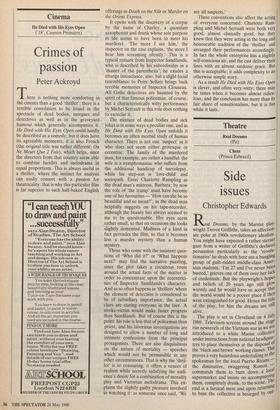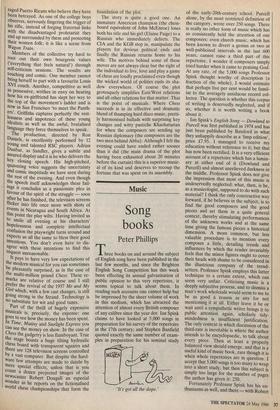Theatre
Real Dreams (Pit).
Chess (Prince Edward)
Side issues
Christopher Edwards
Real Dreams, by the Marxist play- wright Trevor Griffiths, takes an affection- ate poke at 1960s revolutionary idealism. You might have expected a rather sterner gaze from a writer of Griffiths's declared persuasion particularly as the `revolu- tionaries' he deals with here are a bungling group of guilt-ridden middle-class Amer" ican students: 'I'm 27 and I've never been busted,' grieves one of them over her lack of credentials. But the playwright's hopes and beliefs of 20 years ago still OW warmly and he would have us accept that the world would be a poorer place if they were extinguished for good. Hence the title of the play; for him the dreams are sull alive. The play is set in Cleveland on 4 July 1969. Television screens around the stage run newsreels of the Vietnam war as we are introduced to a white Maoist collective under instructions from national headcjilar; ters to place themselves at the disposal ol the 'black and brown' working classes. This proves a very hazardous undertaking as the spokesman for the local Puerto Ricans --- the diminutive, swaggering Ramon -7, commands them to burn down a loew supermarket and insists on accompanying them, completely drunk, to the scene. Th raid is a farcical mess and upon returning to base the collective is besieged by out" raged Puerto Ricans who believe they have been betrayed. As one of the college boys observes, nervously fingering the trigger of his rifle, instead of forging fraternal links with the disadvantaged proletariat they end up surrounded by them and protecting their women folk; it is like a scene from Wagon Train.
Members of the collective try hard to root out their own bourgeois values (`everything that feels natural') through self-criticism sessions. The results are touching and comic. One member cannot bring herself to part with a favourite Louis XVI couch. Another, competitive as well as possessive, writhes in envy on hearing how his ex-girlfriend has slept her way to the top of the movement's ladder and is now in San Francisco 'to meet the Panth- ers'. Griffiths captures perfectly the rest- lessness and impotence of these young idealists as well as the awful, brutalised language they force themselves to speak. The production, directed by Ron Daniels, is excellently performed by 12 young and talented RSC players. Adrian Dunbar, as Sandler, gives a subtle and assured display and it is he who delivers the key closing speech. His high-pitched, quavering voice suggests the uncertainty and comic ineptitude we have seen during the rest of the evening. And even though the speech itself acknowledges these fail- ings it concludes as a passionate plea in favour of the spirit of the struggle — soon after he has finished, the television screens flicker into life once more with shots of events in Nicaragua and South Africa. At this point the play wilts. Having invited us to smile all evening at his characters' hopelessness and complete intellectual confusion the playwright turns around and expects us all the same to bless their good intentions. You don't even have to dis- agree with these intentions to find this request unreasonable.
It pays to have very low expectations of the modern musical for you can sometimes be pleasantly surprised, as in the case of the multi-million pound Chess. These re- marks are relative of course and I still prefer the revival of. the 1937 Me and My Girl which, with a few cast changes, is still going strong in the Strand. Technology is no substitute for wit and good tunes. Part of the thrill of hugely expensive musicals is, precisely, the expense: one goes to see how the money has been spent. In Time, Mutiny and Starlight Express you can see the money on show. In the case of Chess the gadgetry is less flamboyant. True the stage boasts a huge tilting hydraulic chess board with transparent squares and there are 128 television screens controlled by a vast computer. But despite the hard- wari 'few attempts are made to dazzle by mere special effects, unless that is you count a dozen projected images of the newscaster Robert Dougall an especial wonder as he reports on the fictionalised world chess championships that form the foundation of the plot.
The story is quite a good one. An immature American champion (the chess- board equivalent of John McEnroe) loses both his title and his girl (Elaine Paige) to a Russian who immediately defects. The , CIA and the KGB step in, manipulate the players for devious political ends and finally the Russian returns home to his wife. The motives behind some of these moves are not always clear but the right of the individual to live, love and play a game of chess are loudly proclaimed even though the wicked world of politics casts its sha- dow everywhere. Of course the plot grotesquely simplifies East/West relations and all other relations for that matter. That is the point of musicals. Where Chess succeeds is in its effective and dramatic blend of thumping hard disco music, pretti- ly harmonised ballads with surprising key changes and witty pastiche Khachaturian for when the composers are sending up Russian diplomacy (the composers are the two men behind Abba). Although I felt the evening could have ended rather sooner than it did (the main drama of the plot having been exhausted about 20 minutes before the curtain) this is a superior music- al of its kind and deserves to recoup the fortune that was spent on its assembly.















































 Previous page
Previous page